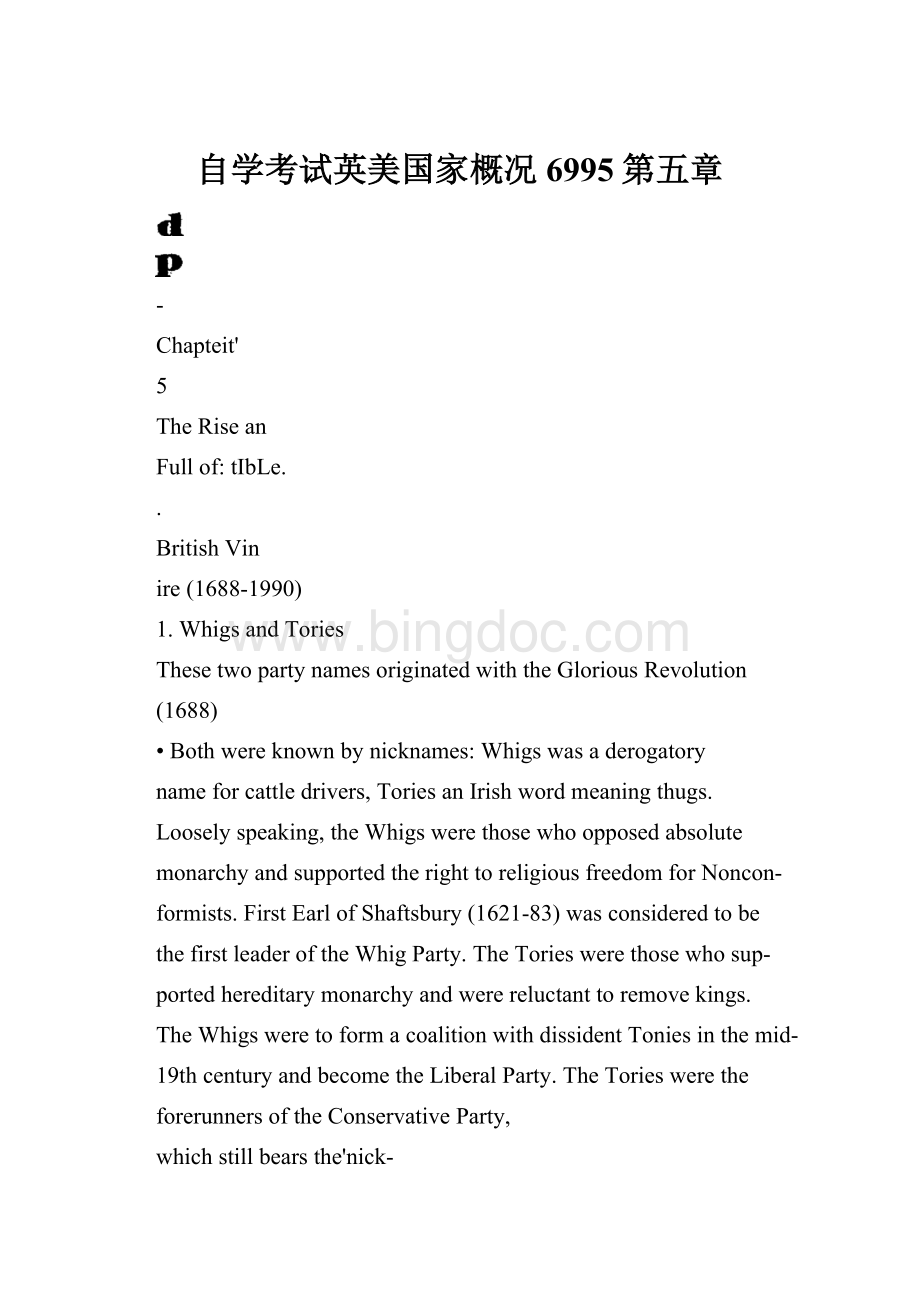自学考试英美国家概况6995第五章文档格式.docx
《自学考试英美国家概况6995第五章文档格式.docx》由会员分享,可在线阅读,更多相关《自学考试英美国家概况6995第五章文档格式.docx(43页珍藏版)》请在冰点文库上搜索。

whichstillbearsthe'
nick-
nametoday.
Bythebeginningofthe19thcenturytheWhigshadnoparticular
programmeandwerenotevenaunitedpartyinthemodemsense.
Theydidnotyethaveanorganizedpartystructure,,withoutparty
fundsforexample.Whigsstoodfor
(1)areductioninCrownpa-
tronage(thepowertoappointpeopletoimportantpositionsandof-
fices)
9
(2)sympathytowardsNonconformists(Methodistsand
otherProtestantsectswhohadbrokenawayfromtheChurchof
67
England)
and(3)
carefortheinterestsofmerchants
and
bankers.
MostWhigswereinfavouralsoofsomekindofParlia-
mentaryreform,butcouldnotagreehowfarthisreformshouldgo.
(e.g.Shouldthemerchantsnowbeallowedtovote,orshouldall
mengetthevote?
)
Toriesweretraditionalists-whowantedtopreservethepowersof
themonarchyandtheChurchofEngland.TheydislikedtheNon-
conformistsandconsideredthemathreattoChurchofEngland'
sin-
fluenceonthepeople;
theywantedstrictmaintenanceoflawand
orderandwereafraidofmobriot,
•andtheydidnotalwaysagreeto
allreforms.Theymightagreeto.somehumanitarianreforms,,
but
werecertainlyagainstParliamentaryreforms.
Therewasanotherbrandofopinion,butwithmuchsmallersup-
portintheParliament.TheyweretheRadicalswhowantedfunda-
mentalreformstogettotherootofproblems.Onlyahandfulof
ParliamentarymemberswereRadicals,butinthelate18thandear-
ly19thcenturiesRadicalswereactiveinParliamentspreadingradical
ideas.TheironecommonaimwasthoroughreformoftheParlia-
mentarysystem.TheyweregreatlyinfluencedbyJeremy
if.
til
Bentham'
sidealsknownasUtilitarianism-Hesuggestedthat
&
I
government'
sfunctionshouldbetoachievethegreatesthappiness
119
ofthegreatestnumber-Thisshouldbedoneintwowaysaccord-
ingtohim:
(1)govermentandadministrationshouldbemadea8
efficientaspossible.Anythingwhichwasnotefficientanduseful
(e.g.educationalsystem,prisonsystem,Parliament)shouldbe
modemized;
and
(2)governmentshouldinterfereaslittleaspossi-
blewithlivesofthepeopleasindividuals.Theyadvocatedlai&
w2
faire,aradicalideaoffreetrade,becausetheybelievedthatthe
importandexportdutiesinterferedwiththenaturalflowoftrade.
68
Agricultural
Changes
in
the
Late
18th
Century
tury.Villageandagriculturewerethebackboneofthenation.
FarmingwasanimportantoccupationinEnglandinthe18thcen-
Changesinfarmingmethodsthereforewouldaffectlivesofmillions.
"
Agriculturalchangesinthelate18thandearly19thcenturieswere
indeedsogreatthattheymeritthetermrevolution'
'
.Traditional
farminginvolvedtheopenfieldvillage,asystemthatdatedbackto
the5thcentury.Villagesweresurroundedby3greathedgeless
fieldswhichcentredallthearableland.Thesefieldsweredivided
intostripssharedoutamongthevillagers.Eachfamily'
slandwas
scatteredabout,sogoodlandwasfairlydistributed.
Muchwas
doneonacommunitybasis.Onegreatfieldleft'
fallow
$9
eachyear
(i
•e.
unused/unsownafterploughing)sothatitssoilrecoveredits
Thismeantonly2/3ofthe
richnessaftertwoyears'
cultivation.
landwascultivatedatanytime.Inadditiontothefieldstherewere
commonsandwastelandsusedbyallvillagerstograzelivestock.
Thissystemwasanidealbasisforthesimplecommunitylifeofthe
countrysideandsubsistencefarmingbeforethemodernindustrial
age.Therewereofcoursedrawbacks:
(1)itwastedlandbecause
offallowfieldsandlandforpaths;
(2)itwaswastefuloflabour
andtime;
(3)livestockfarmingwasdifficultanddiseasesspread
quicklyoncommons.Winterfeedwasrarelyenough,soanimals
wereusuallykilledinaufuninandtheirmeatwassalted,
•and(4)
theopenfieldsystemwasabarrier-toexperiments.
Inthemid-18thcenturythepopulationinEnglandincreased
69
rapidly,andmostofthisincreasewasinthetowns,dependingon
thecountryside,forfood.Greaterproductivitymeanthandsome
profits,solandownerswantedtoreplacethesynallfarmscultivated
46
ontheopen-field"
systbmbylarger,economicallymoreefficient
farmswithhedge-dividedfields.Duringthelate18thandearly
19thcenturiestheopen-field'
systemendedwhentheEnclosure
Actsenabledwealthierlandownerstoseizeanylandtowhichtenants
couldprovenolegaltitleandtodivideitintoenclosedfields.Asys-
temofcroprotationwasintroduced.Thismeantlandcouldbefully
usedwhilethecuffivationoffoddercropsenabledlivestocktobe
keptthroughthewintermonths.Artificialfertilizerandnewagn-
culturalmachinery,suchastheseeddrillinventedbyJethroTull
(1674-1741),also'
madearablefarmingmoreefficientandmore
profitable.The18thcenturyalsosawselectivebreedingofcattle,
sheepandhorsesbyRobertBakewell(1725-95).Animalsby1800
were2to3timesheavierthaneverbefore.Theideaofencouraging
tenantstointroducechangeswasassociatedwithThomasCoke
(1754-1842)ofNorfolkinSouthernEnglandandevenGeorgeIR
wassoenthusiasticaboutchangesatWindsorthathegotthenick-
Enclosurebecamemorefrequentafter1740andclimaxedduring
theturnofthecenturywhenwaragainstFrancemeanthighfood
priceswarwasanincentivetolandlordstoencloseland.
Agriculturalenclosurehadgoodaswellasbadresults:
(1)
Farmsbecame-biggerandbiggerunitsasthegreatboughtupthe
(2)morevegetables,moremilkandmoredairyproduce
small;
wereconsumed,anddietbecamemorevaried;
(3)enclosurewasa
disasterforthetenantsevictedfromtheirlandsbytheenclosures.
Thesepeasantfarmerswereforcedtolookforworkintowns,
70
Riotseruptedin
whichrapidlybecamehopelesslyovercrowded.
manyareasbuttheycouldnotpreventthemarchofprogress.In
IrelandandtheScottishHighlands-landenclosureledtomassemi-
gration,particularlytotheNewWorld;
and(4)anewclasshos-
tilitywasintroducedintoruralrelationships.-Concentrationofland
infewerhandsincreasedthepriceoflandanddashedthelabourers'
aninmlsaddedinsulttoinjury,andmeantmanyhadtoleavethe
hopesofeverowninghisownland.Lossofthecommonlandforhis
landtosurvive.Othersbecamewagelabourers,earningrates
whichwereverylowinspiteofagriculture'
snewprosperity.
M-TheIndustrialRevolution(1780-1&
*30)
TheIndustrialRevolutionreferstothemechanizationofindustry
andtheconsequentchangesinsocialandeconomicorganizationin
Britaininthelate18thandearly19thcenturies.Britainwasthe
firstcountryto.industrializebecauseofthefollowingfactors:
(1)Britainwas,wellplacedgeographicallytoparticipateinEu-
ropeanandworldtrade;
(2)Britainhadapeacefulsociety,
which,
afterthe17thcen-
tury,wasincreasinglyinterestedinoverseastradeandcolonies.In-
ternationaltradebroughtweAthtomerchantsandcitybankers.
Theyandthosewhohad'
-donewelloutofnewfarming.methodspro-
videdcapitalinlargequantitiesforindustrialization.
(3)ThelimitedmonarchywhichresultedfromtheGlorious
Revolutionof1688ensuredthatthepowerfuleconomicinterestsin
thecommunitycouldexerttheirinfluenceoverGovernmentpolicy.
(4)Itwasacountryinwhichthemaintownswerenevertoo
farfromseaports,
orfromrivers,
whichcoulddistributetheir
71
products.
(5)Britainhadmanyrivers,
whichwereusefulfortransport
butalsoforwaterandsteampower.Britainalsohadusefulmineral
resources.
(6)Britishengineershadsoundtrainingascraftsmen.
(7)Theinventorswererespected.
Theysolvedpracticalprob-
lems.
(8)Probablylaissezfaireand
94
Protestantworkethic
11P
helped.
(9)England,Scotland,andWalesformedacustomsunionaf~
ter1707andthisincludedIrelandafter1807.Sothenationalmar-
ketwasnothinderedbyinternalcustomsbarriers.
(10)Theenclosuresandotherimprovementsinagriculture
madetheircontributionsbyprovidingfoodfortherisingpopulation,
labourforthefactories,andsomeoftherawmaterialsneededby
industry.
methodswasatitsheight,similarthingstookplaceinmanufac-
Whilethemovementtoenclosethelandandusenewagricultural
ture.Beforethe18thcenturymostindustriesweredoneinthe
homeinvillagesandsmalltowns,usingverysimplehandoperated
ult-
machines.Nownewtechniquesandwaterpoweredmachines
edinorganizationofindustriesonalargescale.Atthistimepopula-
tionbecameincreasinglyconcentratedintowns,especiallyinMid-
lands,NorthofEngland,SouthernWalesandCentralScotland-
Changes-occurredearliestandquickestintextiles,especiidlycotton
andsilkandinothertradeslikehardware,potteryandchemicals.
Productionofwoolenclothwastraditionalandsomeof